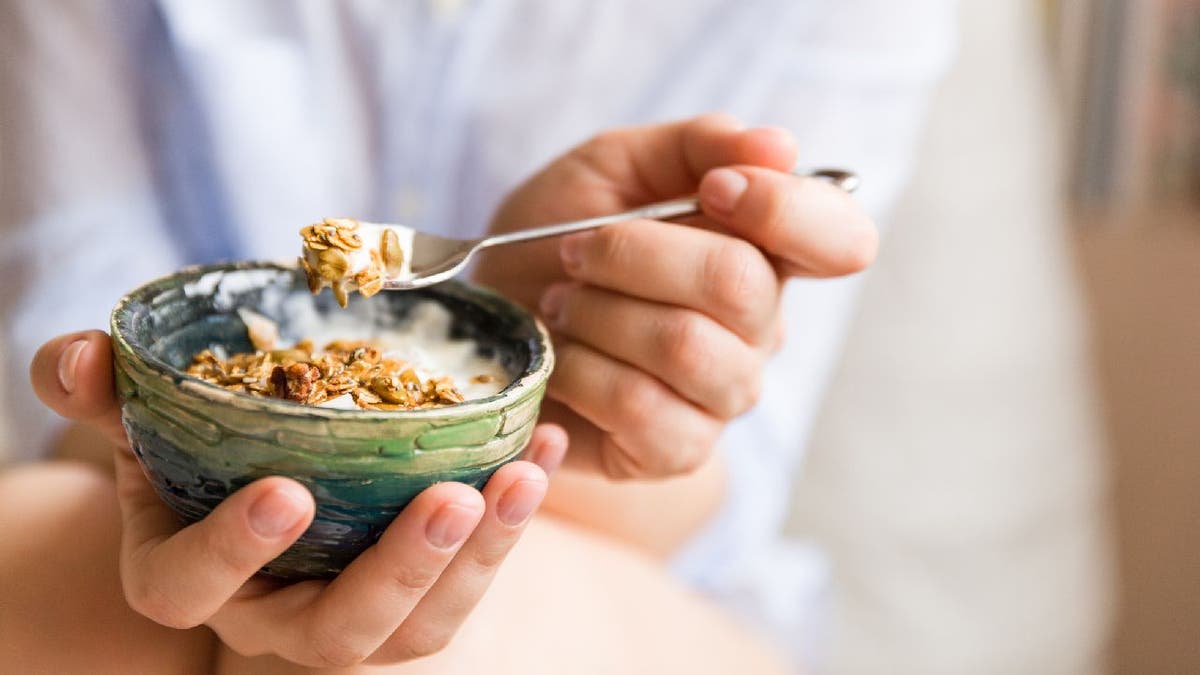Health
Daily showers could be harmful for skin health, some experts claim

Daily showers aren’t necessary and may not have any health benefits, according to some experts.
Proponents of less frequent showers claim that most people take them every day — or multiple times a day — only because this has become a societal norm.
“Why are we washing? Mostly because we’re afraid somebody else will tell us that we’re smelling,” environmentalist Donnachadh McCarthy said in an interview with the BBC.
McCarthy said he only showers once a month, freshening up with sink washes in between.
TO KEEP YOUR TEETH WHITE, BRIGHT AND HEALTHY, FOLLOW THESE 7 TIPS FROM DENTAL EXPERTS
Approximately two-thirds of Americans shower every day, according to Harvard Health.
Some of the most common reasons are to prevent body odor, freshen up after working out and get help in waking up.
Proponents of showering less frequently claim most people take showers every day, or multiple times a day, only because this is today’s societal norm. (iStock)
Potential health impacts of daily showers
Robert H. Shmerling, M.D., senior faculty editor of Harvard Health Publishing, noted in an article for Harvard Health that frequent hot showers remove the healthy oils and “good” bacteria from the skin.
As a result, the skin can become dry, itchy or irritated, he noted.
ARE THE BENEFITS OF COLD SHOWERS WORTH THE DISCOMFORT? EXPERTS WEIGH IN
The skin may also become more susceptible to infections and allergic reactions, as harmful bacteria and allergens are able to enter through dry, cracked areas.
Daily showers could also weaken the immune system, Shmerling warned.
“Our immune systems need a certain amount of stimulation by normal microorganisms, dirt and other environmental exposures in order to create protective antibodies and ‘immune memory,’” he said.

Some of the most common reasons for showering, say experts, are to prevent body odor, freshen up after working out and get help in waking up. (iStock)
“This is one reason some pediatricians and dermatologists recommend against daily baths for kids. Frequent baths or showers throughout a lifetime may reduce the ability of the immune system to do its job.”
5 TIPS FOR RAMPING UP YOUR SKIN CARE ROUTINE THIS SPRING FROM A BEAUTY EXPERT
Risks could also arise from exposure to chemicals in water — including salts, heavy metals, chlorine, fluoride and pesticides — and in shampoos, conditioners and soaps.

“Daily showers do not improve your health, could cause skin problems or other health issues — and, importantly, they waste a lot of water,” according to one expert. (iStock)
“Overcleaning your body is probably not a compelling health issue,” Shmerling wrote.
“However, daily showers do not improve your health, could cause skin problems or other health issues — and, importantly, they waste a lot of water.”
A personal decision
While some dermatologists recommend showering every other day or just two or three times per week, according to Healthline, the frequency of showers comes down to personal preferences, routines and lifestyles.
CLICK HERE TO SIGN UP FOR OUR HEALTH NEWSLETTER
There are some risks associated with not showering enough, experts say, including unpleasant body odor, skin infections, discoloration of the skin, acne, and flare-ups of eczema, psoriasis and dermatitis in people who have those conditions.

Frequent showers can cause the skin to become dry, itchy or irritated, an expert noted. (iStock)
“While there is no ideal frequency, experts suggest that showering several times per week is plenty for most people (unless you are grimy, sweaty or have other reasons to shower more often),” said Shmerling in the Harvard Health article.
“Short showers (lasting three or four minutes) with a focus on the armpits and groin may suffice.”
Fox News Digital reached out to Shmerling for additional comment.
For more Health articles, visit www.foxnews.com/health.

Health
Mercury In Taurus: What It Means for Your Zodiac Sign

Sign Up
Create a free account to access exclusive content, play games, solve puzzles, test your pop-culture knowledge and receive special offers.
Already have an account? Login
Forgot your password?
Get back to the Sign In
Use left and right arrow keys to navigate between menu items.
Use escape to exit the menu.
Health
Eating yogurt could help prevent one common disease, according to the FDA

Can incorporating yogurt into your diet keep diabetes at bay?
The U.S. Food and Drug Administration (FDA) has implied that it’s possible.
The health agency announced in March that it will not object to a claim from Danone North America — maker of Dannon and other popular yogurt brands — that regularly eating yogurt could reduce the risk of type 2 diabetes.
EATING ONE TYPE OF FRUIT REGULARLY COULD REDUCE DIABETES RISK IN WOMEN, STUDY SUGGESTS: ‘INCREDIBLY HEALTHY’
The FDA intends to allow the claim to appear on yogurt food labels, “provided that the qualified health claims are worded so as not to mislead consumers, and that other factors for the use of the claim are met.”
“After reviewing the petition and other evidence related to the proposed qualified health claim, the FDA determined that there is some credible evidence supporting a relationship between yogurt intake and reduced risk of type 2 diabetes, but this evidence is limited,” the FDA said in a statement.
The FDA said it will not object to a claim that regularly eating yogurt could reduce the risk of type 2 diabetes. (iStock)
The health claim that the FDA recently approved is referred to as a “qualified claim.”
That means the evidence isn’t strong or conclusive, but is suggestive of benefit to human health, noted Sherry Coleman Collins, a food allergy dietitian and expert from the Atlanta metropolitan area.
UTAH MOM FIGHTS FOR HER DAUGHTER’S ACCESS TO DISCONTINUED DIABETES MEDICATION: ‘LIFE-SAVING’
Regular consumption is considered 2 cups (3 servings) per week of yogurt, which is the minimum amount for this qualified health claim.
“I don’t like the idea of suggesting that one food alone has the power to reduce disease, because we know it’s really all about the pattern of eating,” she told Fox News Digital.

Regular consumption is considered 2 cups (3 servings) per week of yogurt, which is the minimum amount for the qualified health claim. (iStock)
“Yogurt — as part of a diet rich in plant-based foods like fruits, vegetables and whole grains, protein foods like lean meats and/or beans, lentils and soy, and fermented dairy — has shown to be very health-promoting,” Collins added.
Yogurt that contains live, active cultures is a great way to get good bacteria in the diet, according to Collins.
CLICK HERE TO SIGN UP FOR OUR HEALTH NEWSLETTER
“A healthy gut, which is one with diverse microbiota and heavy in healthy strains, reduces the risk of many chronic conditions,” she said.
“The good bacteria found in fermented dairy are associated with overall better health and lower rates of disease, including type 2 diabetes.”

“Plain Greek yogurt is fantastic, because it’s high in protein and calcium, and you can adjust the sweetness to your liking by adding a little honey and/or fruit,” a dietitian said. (iStock)
Tanya Freirich, a registered dietitian nutritionist in Charlotte, North Carolina, who practices as The Lupus Dietitian, said she agrees that unsweetened yogurt can be beneficial in reducing diabetes risk as a source of protein and probiotics.
Freirich noted, however, that there isn’t “one magic food” that can reduce the disease despite all odds.
“Health is a sum of all of your habits, and cannot be radically changed by one food item.”
“People should speak with a registered dietitian and their health care provider about an overall healthy eating pattern and lifestyle that would serve them best,” she told Fox News Digital.
“Health is a sum of all of your habits, and cannot be radically changed by one food item.”
IMAGE
When choosing yogurt, Collins recommended looking for varieties that are low in added sugar.
“Plain Greek yogurt is fantastic, because it’s high in protein and calcium, and you can adjust the sweetness to your liking by adding a little honey and/or fruit,” she said.
There’s likely no additional benefit beyond a couple of servings, Collins said.
Freirich added that adding the diabetes reduction claim to all yogurt packaging could carry a risk.
“Many yogurts have a lot of added sugars or high-sugar add-ins, like fruit syrup, chocolate and even cookie pieces, which would certainly reduce any benefit from the protein and probiotics,” she told Fox News Digital.
Fox News Digital reached out to Danone requesting comment.
For more Health articles, visit www.foxnews.com/health.
Health
This Meno-Belly Diet Heals the Hidden Nerve Glitch That Makes It Hard to Lose Weight After Age 50

Sign Up
Create a free account to access exclusive content, play games, solve puzzles, test your pop-culture knowledge and receive special offers.
Already have an account? Login
Forgot your password?
Get back to the Sign In
Use left and right arrow keys to navigate between menu items.
Use escape to exit the menu.
-

 Politics1 week ago
Politics1 week agoStefanik hits special counsel Jack Smith with ethics complaint, accuses him of election meddling
-

 Politics1 week ago
Politics1 week agoThe White House has a new curator. Donna Hayashi Smith is the first Asian American to hold the post
-

 World1 week ago
World1 week agoTurkish police arrest hundreds at Istanbul May Day protests
-

 News1 week ago
News1 week agoVideo: Police Arrest Columbia Protesters Occupying Hamilton Hall
-

 Politics1 week ago
Politics1 week agoAdams, NYPD cite 'global' effort to 'radicalize young people' after 300 arrested at Columbia, CUNY
-

 News1 week ago
News1 week agoPolice enter UCLA anti-war encampment; Arizona repeals Civil War-era abortion ban
-

 Politics1 week ago
Politics1 week agoNewsom, state officials silent on anti-Israel protests at UCLA
-

 News1 week ago
News1 week agoSome Republicans expected to join Arizona Democrats to pass repeal of 1864 abortion ban















